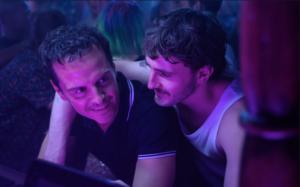ALL OF US STRANGERS: 4 STARS. “Not an ‘I see dead people’ rehash.”
 There will likely not be a more melancholic movie this year than “All of Us Strangers,” a new, otherworldly study of grief, adapted from a Japanese ghost story by Taichi Yamada, that is grounded by real, earthbound emotion
There will likely not be a more melancholic movie this year than “All of Us Strangers,” a new, otherworldly study of grief, adapted from a Japanese ghost story by Taichi Yamada, that is grounded by real, earthbound emotion
Andrew Scott, best known for portraying James Moriarty in the BBC series “Sherlock,” and his role as the “hot priest” on “Fleabag,” is lonely screenwriter Adam. He lives alone in an abandoned London high rise, empty save for Harry (Paul Mescal), who lives on the sixth floor.
They meet when Harry, unannounced, arrives at Adam’s door with a bottle of whiskey. “I saw you looking at me from the street,” he says. “I’ve seen you a bunch of times, coming and going with your head down.” He’s fishing for an invite in, but Adam keeps the door between them.
Adam’s new project is a script set in 1987. To put himself in the right mindset he listens to music from the era, and makes a visit to his childhood home. There, he encounters the ghosts of his parents, played with warmth by Claire Foy and Jamie Bell. Killed in a car accident when Adam was twelve, they are stuck in 1987, while he exists in present day.
“You were just a boy,” says mom, “but now you’re not. You look different but it’s you. I thought you’d be hairier, like your dad.”
Visiting with these apparitions from the past provides a measure of closure for him, as he attempts to make up for decades of missed moments.
Back in London, he and Harry begin a relationship, the first meaningful connection of his adult life. “I’d always felt alone,” says Adam. “This is a new feeling.”
“All of Us Strangers” is a supernatural family drama, but it isn’t an “I see dead people” rehash. It is a chance for Adam to get to know the parents who left him, to tell them about his life, hear them tell them they love him and are proud of him, and possibly most importantly, get to say goodbye. It’s a work of melancholy, a study of one man coping with grief and loss, that is both gentle and devastating.
It’s never clear whether the parents are hallucinations, dreams or actual ghosts, but Scott’s contemplative performance renders that question moot. What’s important is Adam’s relationship to them, how they make him feel, not if they are real or not.
You may question what is real, and what is not throughout, but the individual moments—a father embracing his son for sins committed years ago, a mother’s comforting touch, Harry and Adam relaxing at home, happy and in love—feel real, and are by times moving, painful and utterly earthbound expressions of the power of love in the face of Adam’s unbearable loneliness.
“All of Us Strangers” is an intimate, haunting film that comforts and aches in equal measure.
